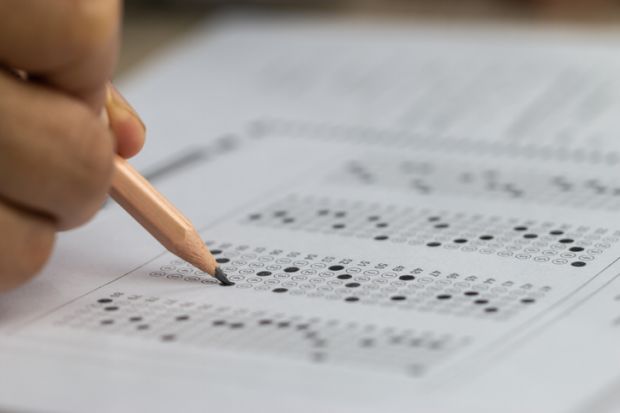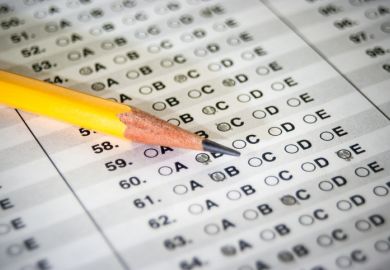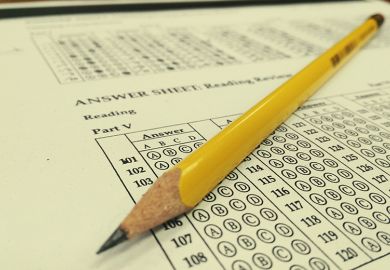For more than 70 years, applicants for graduate study in the US have typically been required to complete the Graduate Record Examination (GRE). Measuring analytical writing skills and verbal and quantitative reasoning, the test is meant to supplement an applicant’s undergraduate grades, recommendation letters and other affirmations of their fitness for graduate-level study.
However, during the pandemic, many graduate schools temporarily waived the GRE requirement amid the closure of testing centres, and a national debate peaked over whether to remove the requirement permanently.
Even before the pandemic, some schools had joined what has been termed the GRExit movement, dropping the GRE or making it optional for applicants. This movement is a reaction to the argument that lower scores disqualify otherwise capable but economically disadvantaged students and ethnic minorities.
However, opting out of the GRE is not the magic bullet to fix lack of diversity in graduate schools and academic common rooms. On the contrary, removing one of the only objective comparative measures in the application package leaves only the subjective measures for admission committees to review. This elevates the role of possible bias in the admission process.
I have taught a GRE preparation course for the past 10 years, as part of my role as professor of psychology at a primarily undergraduate US university. I conclude that the GRE score is graduate schools’ ideal measurement tool for the personality traits they seek in applicants. High GRE scorers have mastered self-discipline and time management. Regardless of their level of privilege or lack thereof, success on GRE test day signals their readiness for graduate-level study.
Thomas Edison famously said that “success is 10 per cent inspiration and 90 per cent perspiration”. Even Albert Einstein took a similar view, claiming that “it’s not that I’m so smart: it’s just that I stay with problems longer”. Such quotations remind us that great achievements reflect work ethic as much as they reflect innate ability. Daily practice of GRE problems produces a higher score: this is a proven formula in test-preparation circles. Amid the typical college student’s time demands – course load, paid work, caring for family – the high scorer managed their time well enough to fit in the requisite GRE practice.
Having persisted through countless frustrating study sessions, the eventual high scorer demonstrated confidence and resilience.
On test day, under the high stakes and pressure of knowing that admissions tutors are watching, the high scorer had the grit and stamina to perform at a superior level throughout the gruelling four-hour exam.
Such self-discipline is uncommon, but it is necessary for success in graduate school. Great success on GRE test day signals the establishment of such traits, regardless of the test taker’s level of privilege or lack thereof.
Yes, in a perfectly fair world, every applicant to graduate school would receive a free GRE preparatory course, a waived test fee ($205) and a free GRE practice test book (~$20). But the individual test takers would still have to discipline themselves to enact a daily study routine of GRE practice questions, memorising vocabulary lists and solving mathematical problems for weeks or months prior to test day. In that sense, there are no short-cuts for the privileged.
Dropping the GRE will only intensify the difficulty of admission committees’ task. Levels of self-discipline and time management skills are difficult to glean from other components of the application package. Undergraduate grading standards (GPA) may vary widely according to course rigours and institutional reputations. The contents of recommendation letters depend in large measure on students’ foresight to get themselves noticed in the classroom and to cultivate a positive impression on the subjective judgement of letter writers.
In contrast, the GRE is a neutral playing field, with every applicant experiencing the same test under the same conditions. As a result, a GRE score is unambiguous. A high score is always impressive. And a low score should always raise red flags, whoever the applicant is.
John Gomez is professor of psychology and a GRE prep instructor at Our Lady of the Lake University in San Antonio, Texas.
Register to continue
Why register?
- Registration is free and only takes a moment
- Once registered, you can read 3 articles a month
- Sign up for our newsletter
Subscribe
Or subscribe for unlimited access to:
- Unlimited access to news, views, insights & reviews
- Digital editions
- Digital access to THE’s university and college rankings analysis
Already registered or a current subscriber? Login








